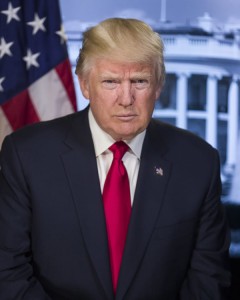Trump’s Second Impeachment
Thursday, January 14th, 2021On Wednesday, January 13, Donald J. Trump became the first United States president to be impeached twice. Impeachment is the formal accusation of serious misconduct against a government official. In this case, the accusation against Trump included incitement of insurrection—that is, encouraging an uprising against the government. Impeachment is an extraordinary check on presidential power. The Constitution specifies that officials shall be removed from office after impeachment for, and conviction of, “treason, bribery, or other high crimes and misdemeanors.”
In the article of impeachment, Trump is accused of “inciting violence against the government of the United States.” The accusation stems from the violent, pro-Trump demonstration in which rioters attacked the United States Capitol on Jan. 6, 2021. The accusation alleges that Trump—in a rally held before the event and on social media—encouraged supporters who stormed the Capitol, endangering hundreds of lives.
On the morning of January 6, members of Congress had convened at the Capitol to certify Democrat Joe Biden as winner of the November presidential election. However, the count was disrupted by protests that turned violent. Supporters of President Trump stormed the Capitol, pushing through barriers and climbing walls. Lawmakers were quickly ushered to safety. Shouting and waving flags, the unruly mob entered the official chambers of Congress, as well as the personal offices of senators and representatives. Some damaged or stole property. Others took pictures of themselves occupying one of the nation’s most sacred buildings. Several people were killed in and around the Capitol. Dozens of people have been arrested since the attack, and many more are being investigated.
One week after the attack, the vote for impeachment took place in the House of Representatives, passing 232 to 197. Unlike Trump’s first impeachment, in 2019, the vote did not strictly fall along party lines. A number of House Republicans joined Democrats in voting to impeach. The vote set the stage for a trial to occur in the Senate. If the Senate votes to convict Trump, he may be barred from ever holding public office again.
Trump’s two presidential impeachments are part of only four in the country’s history. In 1868, the House impeached President Andrew Johnson, who had inherited a wartime dispute between his predecessor, Abraham Lincoln, and Congress over how to treat the South after the Civil War. After impeachment, a Senate vote failed to remove Johnson from office. In 1998, the House of Representatives impeached President Bill Clinton for perjury and obstruction of justice. The charges developed out of Clinton’s efforts to conceal an improper sexual relationship. The House sent its findings to the Senate, which conducted a trial and found Clinton not guilty. Another president, Richard Nixon, resigned from office to avoid impeachment in 1974 for his involvement in the Watergate scandal.




